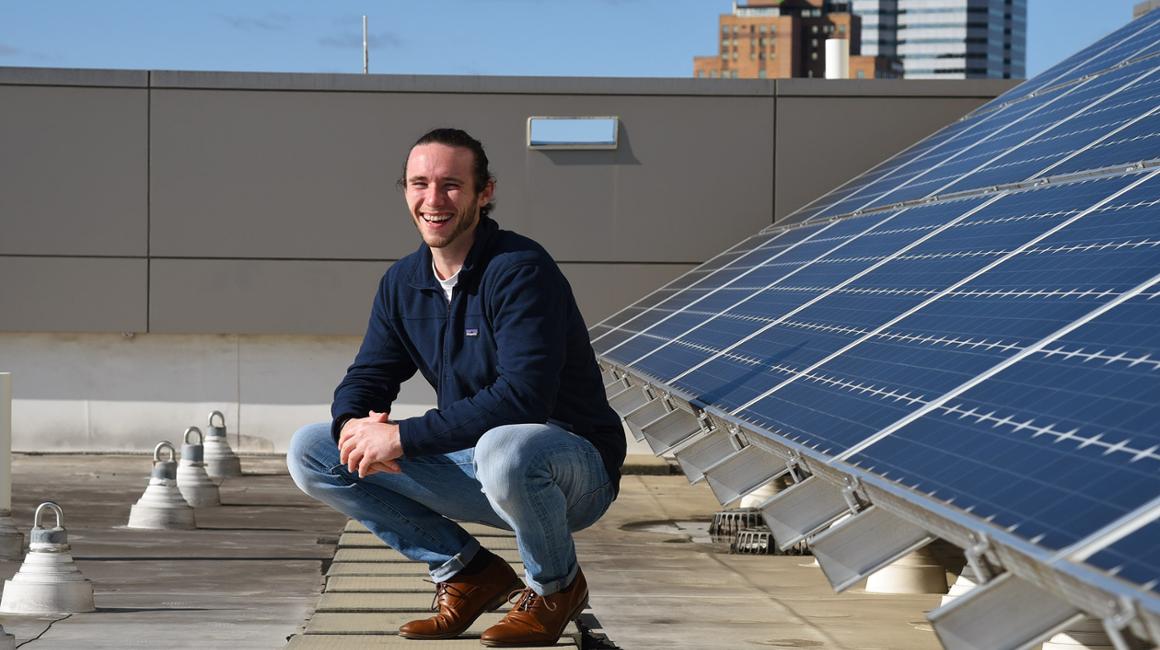A guy who expresses his passion with a wind-turbine tatoo and finds the One-Year MBA program and like-minded individuals who think progressively about climate change and other sustainability issues at Duquesne University a perfect fit.
Alec was a student in the No. 1 ranked 1-Year MBA Program in the Palumbo-Donahue School of Business. Alec always knew he wanted to pursue a master’s degree, but it took having a job in the oil and gas industry, and a road trip out west, to connect his passion for and the importance of sustainability with his future aspirations.
“I’m a rock climber and was out climbing with a couple I know,” he says. “The woman I was climbing with asked about my wind turbine tattoo I have on my ankle and I told her I was passionate about sustainability. She was, at that time, a student in Duquesne’s MBA Sustainability program (now called the 1-Year MBA) and suggested I check it out.”
After a conversation with Sustainability, Operations and Supply Chain Management Professor Dr. Robert Sroufe and a visit to Rockwell Hall’s newly renovated, LEED-certified 6th floor, Alec instantly fell in love with both the program and Duquesne’s campus. “Dr. Sroufe just radiates knowledge and I remember thinking ‘Wow, I want to know what this guy knows.’ I knew I needed to be a part of the program and learn from him.”
Alec later applied to and was selected for one of Sroufe’s fellowship positions, which includes a $10,000 scholarship, and the opportunity to research and co-write scholarly articles. Alec and Sroufe’s current project Managing Transparency and CO2—The Missing Link in Corporate Strategy examines corporations’ responsibility for carbon emission reduction.
Alec was drawn to Duquesne’s 1-Year MBA program for several reasons—particularly the small class sizes and networking opportunities with business leaders and policy makers in local corporations and government. He has made connections with program alumni who have introduced him to farmers and non-profit trailblazers. “I wanted to be part of a community of people who have similar goals and visions for our planet’s future.”
So far, Alec’s favorite part of the program has been his group consulting project with the sustainability sector of the City of Pittsburgh government. His group has proposed an idea to create a network of businesses to connect and create a community called Pittsburgh Companies for a Circular Economy (PCCE), where the outputs of one entity become the inputs of another. His group proposes the City works with the United States Business Council for Sustainable Development (USBCSD) to create a materials marketplace platform in Pittsburgh that enables these connections.
“I went to undergraduate school in a small coal town, so I had never been around like-minded individuals who think progressively about climate change and other sustainability issues until now,” he says. “I couldn’t be more impressed with my professors and cohort at Duquesne. This program is truly one of the best things to happen to me.”
His connections and projects have expanded the horizons of what Alec expected his education, and his path, could be. Now, Alec hopes to eventually work in sustainable regenerative agriculture, which focuses on practices such as cover cropping and livestock grazing—practices to cycle nutrients naturally without aggressively disturbing the soil to keep carbon stored underground.
Alec says regeneration can help farmers adapt to changing market demands, while preserving the health of our soil—and our planet.
“I’m hopeful because the market itself is shifting—consumers, stakeholders and investors are starting to demand sustainability initiatives in the private sector,” he says. “I want to be part of a change and have meaning in my work. We can’t dismiss climate change issues to a future generation anymore. Every decision we make today is a decision that impacts our future.”
News Information


